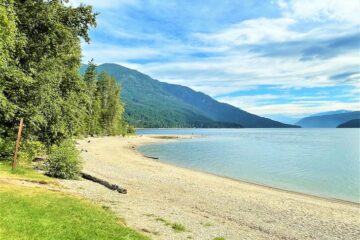Another season Mussel Free in the Columbia Shuswap!

Photo Caption: Shelter Bay pier on Arrow Lakes Reservoir, tested bi-weekly for invasive mussels, none found in 2021 (Photo: CSISS).
Invasive species can be extremely damaging to the health of both the ecosystem and our economy. At the top of the ‘Most Unwanted’ list are two aquatic invasive species: zebra and quagga mussels. The Columbia Shuswap Invasive Species Society (CSISS) partners with the Ministry of Environment and Climate Change Strategy (ENV), the Habitat Conservation Trust Foundation (HCTF) and the Shuswap Watershed Council (SWC) to monitor lakes in the upper Columbia and Shuswap watersheds for invasive mussels as part of the Provincial Invasive Mussel Defence Program.
In a recent statement, ENV reported that 75 waterbodies in BC were monitored throughout the season by various organizations (including CSISS), collecting 900 plankton samples, all of which showed no evidence of invasive mussels.
Plankton samples, from Mara Lake at Sicamous, were positive for invasive clam larvae (Corbicula fluminea), a different invasive species which is already known to be present in the connected Shuswap lake.
To date invasive mussels have not been detected in any BC waterways, including the Columbia Shuswap. If invasive mussels were to become established in a BC waterbody, it would be extremely difficult to eradicate them and very costly to manage the negative impacts. Prevention is key. Transportation of mussel fouled watercraft is a known way in which these species travel between waterbodies, even over large distances.
The BC Ministry of Environment and Climate Change Strategy administers the Provincial Invasive Mussel Defence Program which inspects watercraft entering and traveling throughout the Province. During the 2021 season, the Ministry reported that watercraft inspection stations were operational from early April to late October. You can find more information on the Provincial watercraft inspection stations by visiting: www.gov.bc.ca/invasivemussels
During summer outreach activities, CSISS staff observed boaters hauling their boats from the lake to see if they were removing their drain plug, as part of the process of Cleaning Draining and Drying their watercraft. “Every single boater we observed removed their drain plug after hauling their boat out of the lake, which is a very encouraging sign that boaters are taking responsibility for helping to keep these beautiful lakes safe from invasive species,” said Sue Davies-McGill, Aquatic Coordinator at CSISS.
To prevent the spread of invasive mussels into our lakes and rivers ensure to clean, drain and dry your watercraft and equipment after every use Travellers bringing watercraft to BC are encouraged to visit the provincial website, https://www2.gov.bc.ca/gov/content/invasive-mussels/bringing-your-boat-to-bc and must stop at any watercraft inspections stations while traveling with their watercraft.
Members of the public are asked to please report any suspected invasive species via the Provincial “Report Invasives BC” smartphone application (available for download from www.gov.bc.ca/invasive-species) and any suspected invasive zebra or quagga mussels to the Report All Poachers and Polluters hotline 1-877-952-7277.
The Columbia Shuswap Invasive Species Society is a non-profit organization dedicated to the prevention, management and reduction of invasive species in the Columbia Shuswap Regional District. CSISS is thankful for the generous support of the Habitat Conservation Trust Foundation, Shuswap Watershed Council, Columbia Basin Trust, the Columbia Shuswap Regional District, and the Province of B.C.


